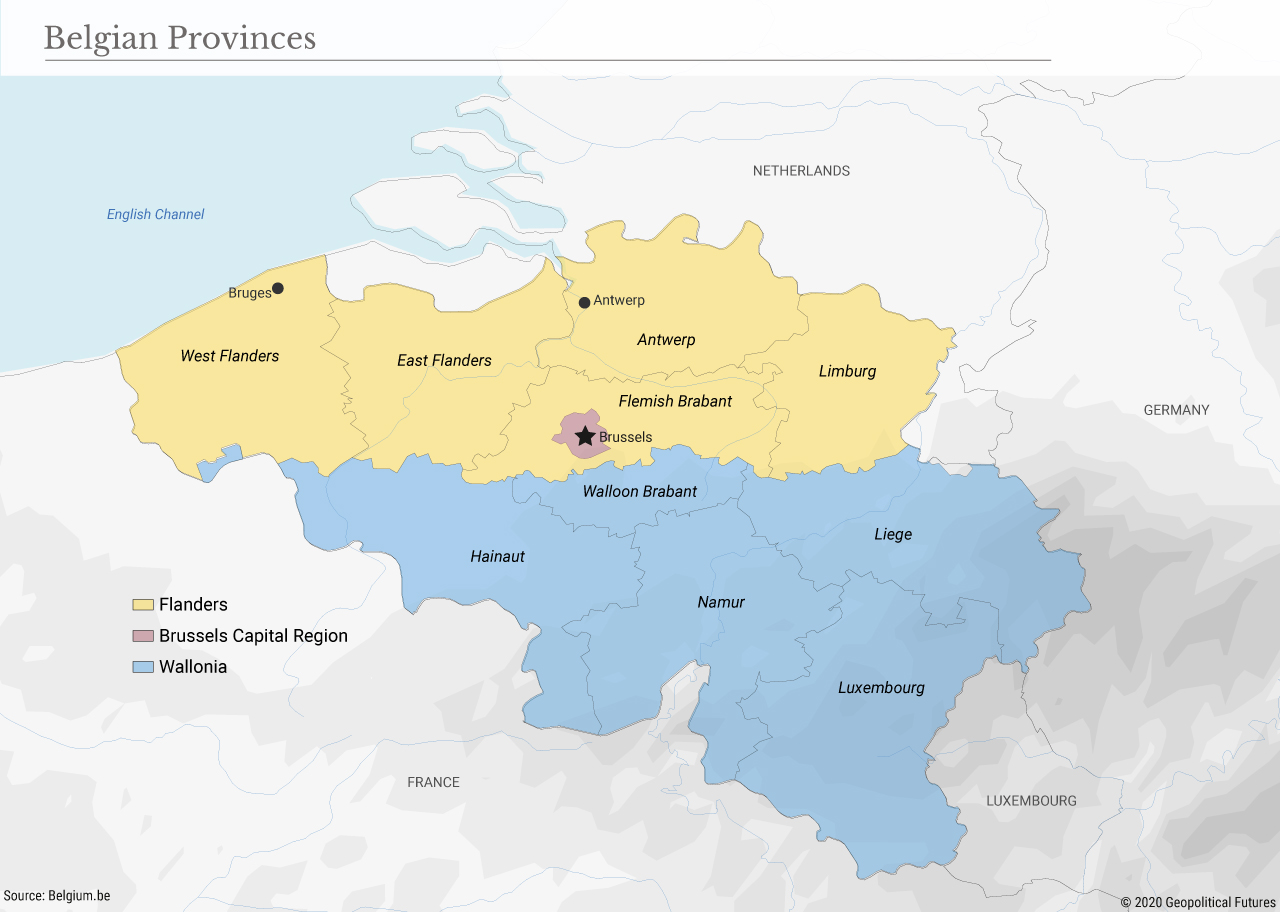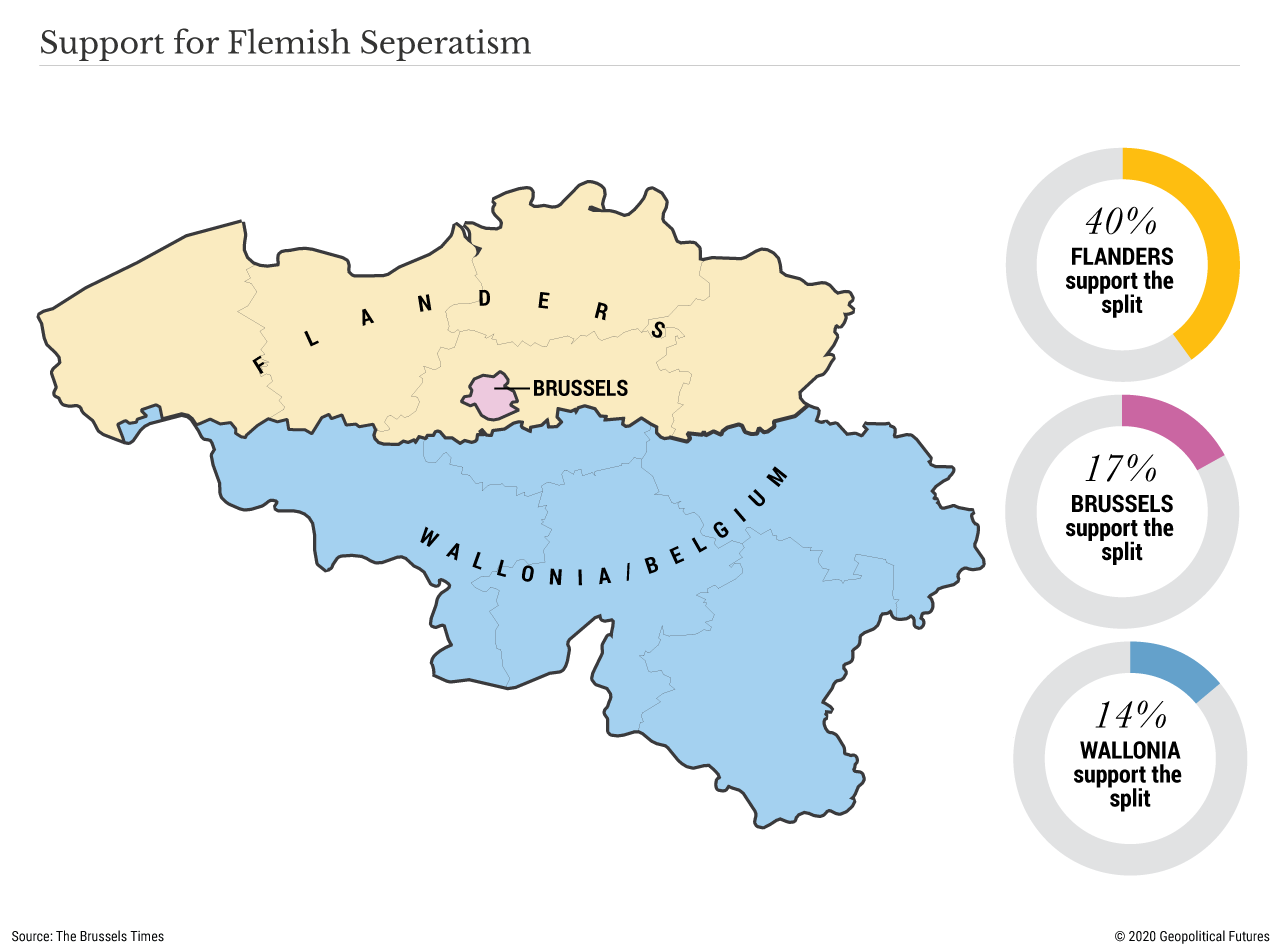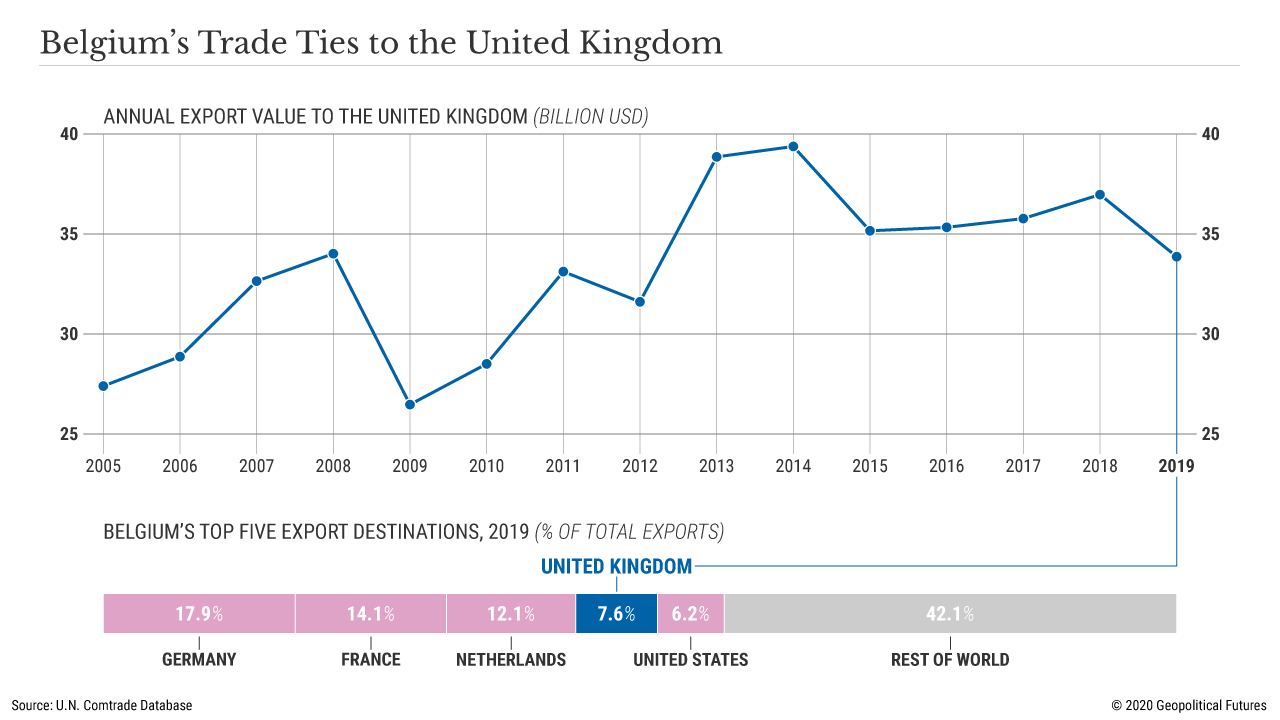|
As the December 2020 deadline for a
negotiated trade deal approaches and the European Union and the United
Kingdom fail to get on the same page, a hard Brexit looks more and more
likely. In a no-deal scenario, British-EU trade would default to World
Trade Organization rules that would damage both economies by raising
tariffs, delaying international deliveries and so on. The EU is expected
to fare better than the U.K. Forecasts show that
British gross domestic product will drop by about 5 percent over 10
years, while the EU’s GDP will fall by a little less than 1 percent.
Yet, some EU members will be worse
off than others, none more so than the EU’s host country, Belgium. With some 8 percent of its
GDP relying on trade with the U.K., Belgium is uniquely
exposed to Brexit’s economic shockwaves. Naturally, there will be
domestic political consequences to the coming economic pain. The hit to
exports will unevenly affect Belgian regions, hitting the country’s
northern commercial hub, Flanders, the hardest, aggravating a political
rivalry shaded by separatist sentiment that has plagued Belgium for its
entire modern history.
Disparities
Belgium’s Dutch-speaking Flemish and
its French-speaking Walloons have been at loggerheads for centuries,
dating back to the country’s role as a buffer zone between the Napoleonic
and Dutch empires. It was not until 1830, when Belgium was a part of the
Kingdom of the Netherlands, that anti-Dutch sentiment led to revolution,
marking the nation’s independence and creating an internal divide –
punctuated by cultural, linguistic and religious differences – that endures today.

(click to enlarge)
Important as these differences may
be, Belgium’s present-day divide is defined by economic disparity. During
the 19th and early 20th centuries, Wallonia was the place to be. Although
it was half the size of Flanders, Wallonia was the site of Belgium’s
fast-growing coal and mining industry, bringing immense wealth to the
south, while its French-speaking population gave the region a reputation
of being an upper-class, bourgeoisie hub. This changed when coal began to
die out. Businesses and financial investment fled north to Flanders,
historically the commercial gateway to the English Channel and North Sea.
Flanders is home to ports in Antwerp and Bruges and is thus a modern hub
of international trade and Belgium’s economic engine, accounting for
roughly 60 percent of the country’s GDP. The north is also home to the
majority of Belgium’s industrial production, hosting a number of
factories and production centers for the petrochemical, textile and
technology industries. Flanders flourished as Wallonia fell behind,
giving way to notable disparities
in employment, education, exports and imports, and contributions to
national GDP.
The regions’ political attitudes
clearly reflect these economic disparities. The south, for example, has
increasingly called for higher taxes
on the north to correct the imbalance. Much of the north regards the
south as burdensome, giving way to demands to cut off the south or reduce
the federal government’s influence on taxation. This has breathed life
into many far-right political blocs such as the Vlaamse Volksbeweging,
Voorpost, Nationalistische Studentenvereniging and the New Flemish
Alliance, and into right-wing movements like the Schild & Vrienden,
which have called for greater independence from the federal government,
secession from Belgium and even reunification with the Netherlands.

(click to enlarge)
Intense Debate
The 2008 economic crisis and the
COVID-19 pandemic have only made things worse. In May 2019, political
divisions were so bad that they created a 15-month stalemate on the
creation of a government that was temporarily solved only when parties elected a caretaker
prime minister, Sophie Wilmes, to manage the coronavirus
outbreak. The pandemic sparked an intense debate between northern and
southern Belgians. In hopes of keeping industries and businesses open,
Flanders wanted modest lockdown measures, while the south favored stricter measures and heftier
bailouts, a debate that sowed more seeds of resentment and
delayed the government response. Current estimates suggest that lockdown
measures will result in a 9 percent loss in GDP this year alone.
Brexit’s economic hit will only
exacerbate the divide. On Jan. 1, 2021, Belgium will be one of EU members
worst affected by the U.K.’s withdrawal from the European single market –
with the majority of the economic damage in the already-aggravated
Flemish north. Overall, Belgium’s national bank predicted that Brexit
would cost Belgium roughly 1 percent of its GDP, with the worst-case scenario
forecasting a 2.5 percent loss of purchasing power and nearly
28,000 jobs lost.
The damage, of course, will be felt
most acutely at first in Flanders, whose commercial advantages made it
more uniquely vulnerable to a hard Brexit. The region accounts for more
than 80 percent of Belgian exports to the U.K. and receives 87
percent of imports from the U.K. The largest sector in Flanders to be hit
will be the country’s petrochemical
hub, the world’s second-largest and Europe’s largest cluster,
which comprises 20 percent of Belgium’s total
exports to the U.K. As far as exports go, Brussels and the
French-speaking Wallonia are less exposed, home as they are to
less-important wood, glass and medical exports.
The Belgian government understood as
much and so tried to shield itself from the inevitable shock of the
U.K.’s departure from the single market. The country reduced its exports
– of minerals, pharmaceutical products and road transport materials – to
the U.K. by 12 percent by the second
quarter of 2019 (compared to the previous year), while
offsetting U.K. trade with increased trade among other EU members.
Moreover, the government began a campaign to attract U.K.-based investors
to open subsidiaries in Belgium to mitigate the damage to its services
sector.

(click to enlarge)
Importantly, most of these changes
disproportionately helped the south, where mineral production is
concentrated, and Brussels, an emerging financial and services hub. The
measures ultimately did very little to insulate Flanders from the shock
of Brexit.
Secession in the Cards?
Brexit will certainly reinforce
rising nationalist sentiment in Flanders, but it doesn’t necessarily mean
the north will secede anytime soon. While talks of secession have
increased, competing conservative parties in Flanders have created
political deadlock, and the majority of Flemish citizens are not fully on
board with the idea of secession. Polls conducted at the end of last year
revealed that just 40 percent of Flemish
Belgians support secession, down 6 percent from polls
taken in 2007. Many Flemish citizens understand that breaking
with Belgium could be economically harmful, much as it is in the U.K.,
since it would lose the benefits of Brussels’ financial centers and the
south’s agricultural imports. The costs of establishing a new state –
standing up armed forces, funding new institutions, etc. – would be daunting. This is
likely why Flemish parties have begun to try to hollow out Belgium’s
federal system, further devolving responsibilities to provincial
governments on issues such as transportation, health care, taxation and
governance.
On Jan. 1, 2021, the four-year Brexit
saga will be put to bed one way or another, and the U.K will depart the
European single market. When that finally happens, the EU will be able to
champion the example of a hard U.K. withdrawal as a cautionary tale to
euroskeptic movements. The negative impact on EU export hubs and the
effects of increased political gridlock, as is the case in Belgium, too,
will be a useful message against nationalist movements that call for
withdrawal from the EU, such as the “Italexit” movement pushed among
Italian far-right parties, as well as separatist movements in places like
Catalonia. The EU’s position is strengthened by the fact that divorce
from Brussels – for both the Flemish and euroskeptic countries – is just
too costly a venture. |
0 comments:
Publicar un comentario